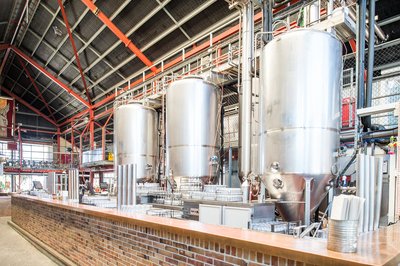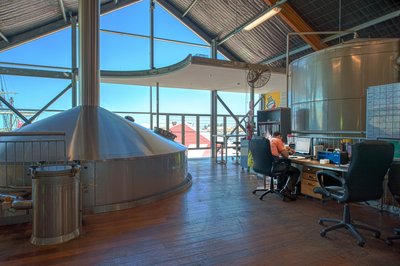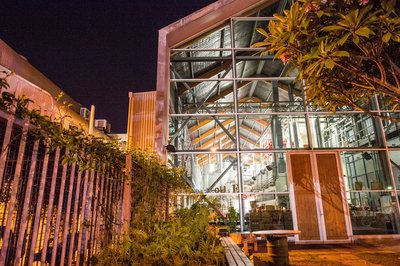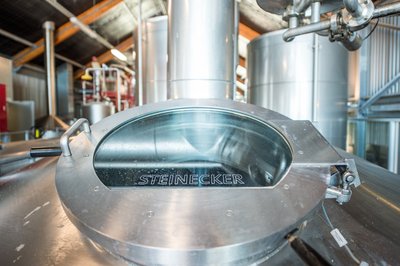From concept to reality: the Little Creatures story
Wednesday, 29 May, 2013
A handful of friends got together at the end of the 20th century, among them a brewer, a winemaker and a beer marketer. Inspired by the vibrant beer culture in north-western USA, they had the idea of brewing a beer with a distinctive taste: hoppy, unpasteurised and inspired by the US Pale Ale beer category.
They aimed to release the brewing process from its exile behind factory walls to render the art of brewing transparent. In Fremantle, the group found the ideal property, which had previously been used as a crocodile farm. The location was spectacular: directly next to the fishing harbour and marina.
This was where the beer buffs translated their idea into corporate reality, supported by Lion Group, which took a 20% stake. They called their brewery Little Creatures, a nickname for the yeast cells that transform a brew into a beer. At the end of 2000, they were serving their first guests Little Creatures Pale Ale.

The bartender doesn’t have to worry about the beer taps running dry: behind the bar are four 40- and 70-hectolitre tanks. The brewery produces Little Creatures Pale Ale, Bright Ale, a pilsner and the Rogers mid-strength. Six times a year, specialty beers are brewed, like Bock, Spicy Christmas Beer and Belgian Beer, each in a 400-hectolitre batch.
Little Creatures now produces over 100,000 hectolitres of beer annually at the Fremantle facility. In the early years, the brewers used a 50-hectolitre brewhouse, but this quickly became too small as demand increased. In 2006, Little Creatures requested quotes from three German brewhouse manufacturers.
“Krones was the right choice for our brewhouse,” said Brewmaster Russell Gosling. “We had already been quite impressed with a Krones bottling line back then.

“The guys from Steinecker were the ones who best understood our concept of integrating the entire process technology into the restaurant and the beer hall,” said Daniel Heary, who served a brewer’s apprenticeship at Little Creatures before studying at the Institute of Brewing & Distilling.
“The brewhouse is very easy to operate, since everything has been automated using Botec F1. And if we do have a question, we just log in to the Krones hotline. After all, we’re a bit cut off from the rest of the world here, and not so easy to reach. That’s why the service hotline is all the more important to us.”
In 2008, the brewhouse was installed, rated at 100 hectolitres of cold cast wort and designed for 10 brews a day. It is composed of a Variomill wet mill, a mash tun, a lauter tun, a heat-holding tank, a Stromboli wort boiler with a vapour condenser and an energy storage tank, warm and cold water tanks, plus a whirlpool. One special feature is a hopbag, in which natural hops are added. The hot wort then flows from the whirlpool via the hopbag directly to the cooling system and into the fermentation tanks. The old English method of the hopbag, which brewers affectionately refer to as the ‘toilet seat’, because of its shape, is used for all the beer varieties except the pilsner.

The brewhouse is in the second hall next to the restaurant on the first floor, with the kit underneath. From the wort boiler, through the glass facade, the brewers enjoy a view of the harbour.
Together with the brewhouse, Krones supplied nine cylindro-conical fermentation tanks (holding 400 hectolitres each), the yeast propagator, the entire piping and a CIP system. To help shoulder the costs, Lion increased its stake in Little Creatures to 34%. In 2010, Little Creatures added a TFS filter to the process technology, plus a buffer tank, a cooling system and a carbonator from Krones.
The kegging and bottling operations have been relocated to a hall a few kilometres away. A Krones line rated at 12,000 bottles/h runs in two-shift operation, with a Kosme bulk glass depalletiser, a Krones Mecafill filler monobloc-synchronised with a rinser and a closer, a Kosme labeller with a cold-glue station for body and neck labels, and a cluster packer, a Kosme carton erector, a Krones Blitzpac packer and a Kosme palletiser.

“The Mecafill filler was particularly important for us, since we don’t put our beers through a tunnel or flash pasteuriser, which means we have to be particularly careful to ensure microbiological safety during filling,” explained Heary.
In 2011, Little Creatures placed an order with Krones to build a complete brewery, including all utilities, in Geelong. In 2012, this project was given a boost when Lion acquired 100% of Little Creatures.
The brewery is designed for an annual capacity of 250,000 hectolitres, with an option for upsizing to 400,000 hectolitres. The 200-hectolitre Steinecker brewhouse features the latest technology, including the EquiTherm energy storage system, combined with a unit-type cogeneration plant. The process technology is supplemented by a Krones bottling line. As of mid-2013, Little Creatures has been able to brew its beers in eastern Australia as well, putting it closer to the nation’s consumers, who can’t get enough of Little Creatures’ distinctive taste.
Specialised compressed air for the food industry
Compressed air is a key utility supporting the food packaging and food processing industries in...
Mars steams ahead with renewable technology for pet food process
Mars Petcare's home-grown sustainability venture Green Steam allows its Wodonga factory to...
Repurposing proteins from beer-brewing waste
Researchers from NTU Singapore have created a method of extracting over 80% of the available...












